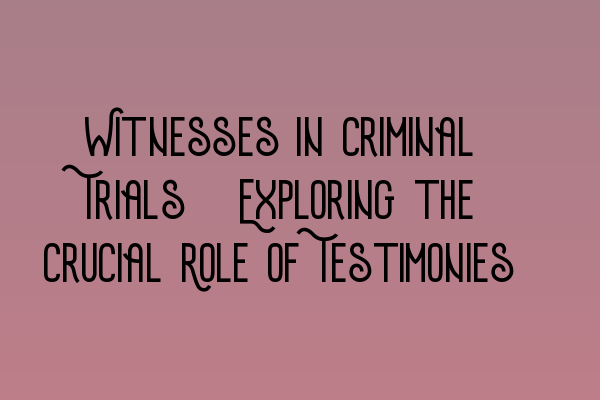Witnesses in Criminal Trials: Exploring the Crucial Role of Testimonies
The criminal justice system relies heavily on witness testimonies to establish the truth and ensure a fair trial. In criminal trials, witnesses play a crucial role in providing firsthand accounts, perspectives, and evidence of the events in question. Their testimonies can make or break a case, influencing the decisions made by judges and juries.
Let’s delve deeper into the importance of witnesses in criminal trials and explore how their testimonies can impact the outcome of a case.
Accuracy and Credibility
The accuracy and credibility of witness testimonies are of utmost importance in criminal trials. The prosecution and defense rely on witnesses to present their version of events accurately and truthfully. However, it is essential to recognize that witnesses can sometimes have biases, faulty memories, or be influenced by external factors.
To assess the accuracy and credibility of witness testimonies, the court considers various factors, including:
- The witness’s demeanor and conduct during examination;
- The consistency of the witness’s statement;
- The witness’s ability to recall specific details;
- Any prior inconsistent statements made by the witness;
- Corroborating evidence or other witnesses supporting or contradicting the testimony.
It is the role of a skilled criminal defense solicitor to effectively cross-examine witnesses and challenge their testimonies when necessary. By raising doubts about the accuracy or credibility of witnesses, a defense solicitor can cast reasonable doubt on the prosecution’s case.
The Effect of Witness Testimonies on the Outcome of a Case
Witness testimonies can heavily influence the outcome of a criminal case. Juries and judges rely on witness accounts to establish the facts, determine guilt or innocence, and deliver fair verdicts. A credible witness with solid evidence can sway decisions in favor of the prosecution or defense.
It’s important to note that witness testimonies are not the sole basis for a conviction or acquittal. They are just one piece of the puzzle that the court considers alongside other types of evidence. However, compelling witness testimonies can significantly impact the overall strength of a case.
The Role of Expert Witnesses
Expert witnesses play a unique role in criminal trials. Unlike lay witnesses who testify about their personal experiences, expert witnesses provide specialized knowledge, opinions, and interpretations related to their field of expertise.
For example, forensic experts can analyze DNA evidence, ballistics experts can examine firearm evidence, and psychiatrists can evaluate mental health issues. Their testimonies can provide crucial insights and help the court understand complex or technical information that is beyond the knowledge of the average person.
Conclusion
Witnesses are foundational components of criminal trials, offering testimonies that shape the outcome of the case. Their accuracy, credibility, and relevance can impact the decisions made by judges and juries, ultimately leading to the delivery of fair verdicts.
The effective cross-examination of witnesses and the presentation of compelling expert testimonies can significantly influence the strength of a case. As a solicitor, it is crucial to understand the role of witnesses in criminal trials and utilize their testimonies strategically to secure the best possible outcome for your client.
